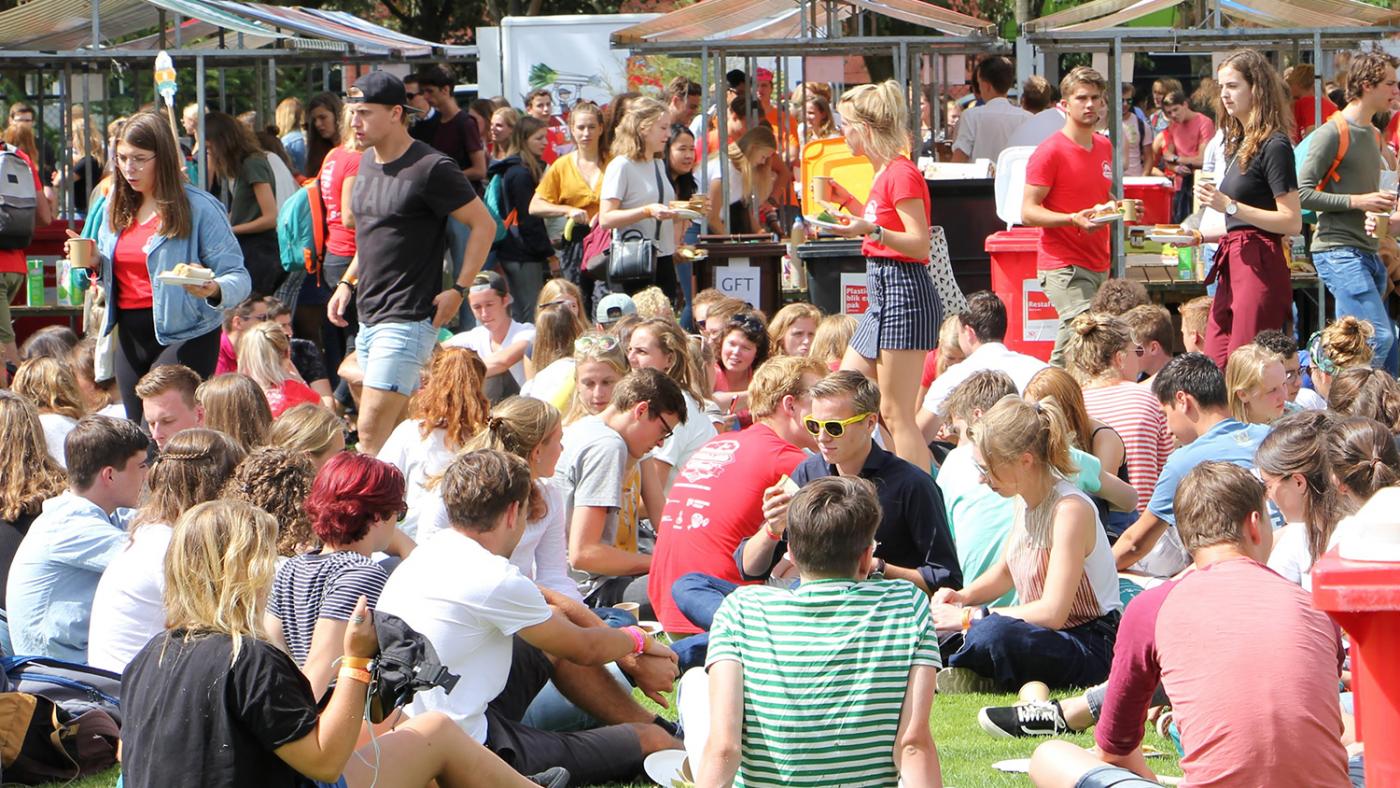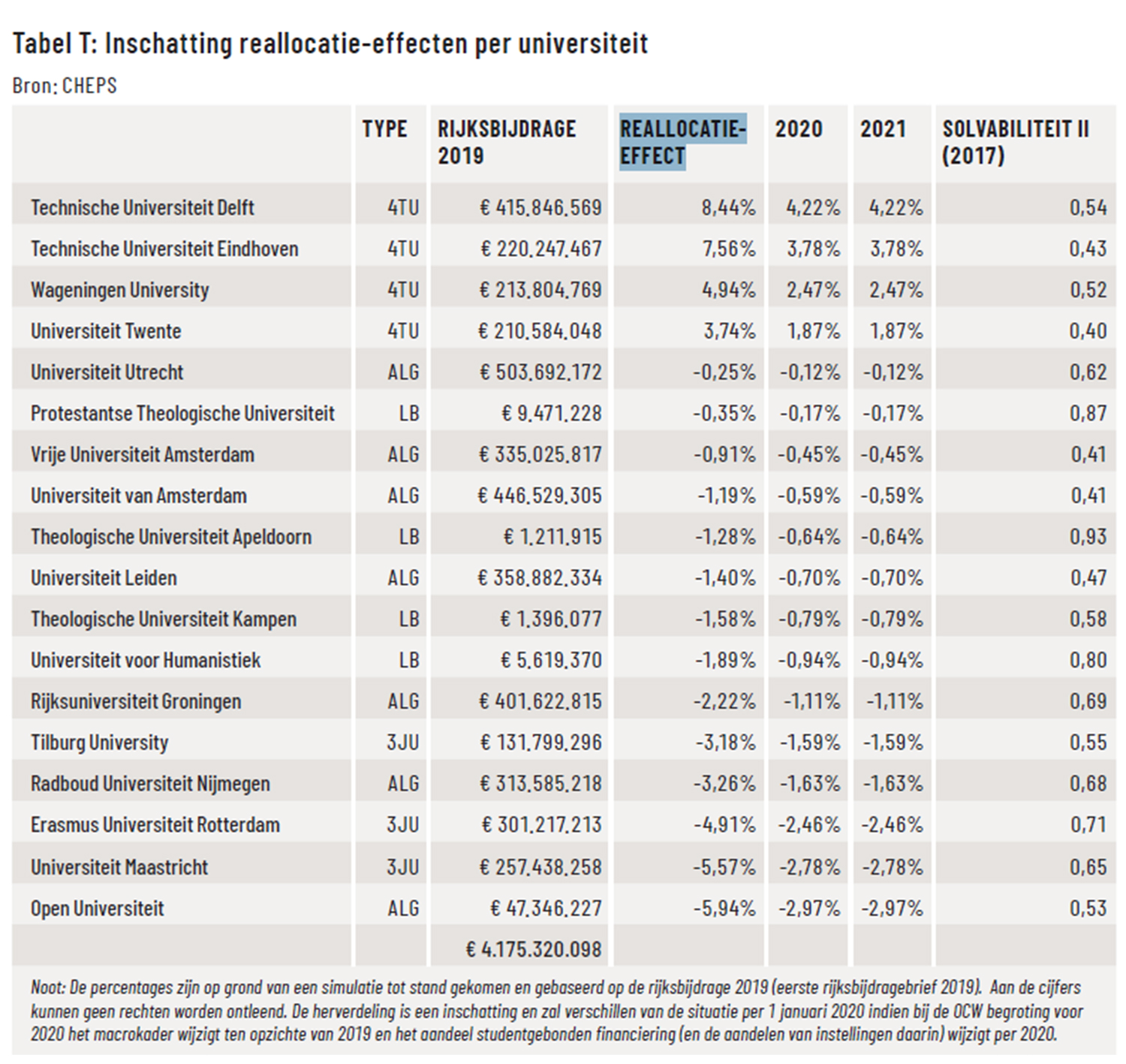New financing system higher education: 1.2 million less for UU

Study programmes in science and technology will receive an additional 250 million euros from the education budget. The funding of universities and universities of applied sciences will depend less on student numbers. In 2020, the fixed part of education funding will be increased, and the varying, student-bound part will be diminished. For the long term, the committee feels it’s important that the inflow of students and the funding of study programmes depend more on the needs of the labour market.
These are a few of the recommendations from the Wissels report (in Dutch ed.), presented today by the committee led by former state secretary Martin van Rijn. The committee says Dutch higher education and research is of high quality, but it’s not viable to keep it this way in the long term. Students and teachers experience more and more pressure, the balance between education and research is skewed, and the student-bound funding is a ‘perverse mechanism’ that threatens to lead to a race to the bottom.
The current system is insufficiently transparent (“we’re steering through fog”) and encourages institutions to attract as many students as possible, including by starting new programmes and introducing English-taught programmes. This leads to capacity issues and freezing admissions, even in Science programmes. Furthermore, education and research are getting in each other’s way, Van Rijn warns, because research funding doesn’t keep the same pace as the increase of the number of students.
The perverse growth incentive should therefore be curbed, the committee says. They speak of a shift of 300 million euros in academia and 250 million euros in universities of applied sciences.
Science and technology
Van Rijn’s recommendation of granting the largest part – 250 million – of this reallocated budget to universities with science and technology programmes, is a controversial one. One condition is that they improve their collaborations as well as the study success of their students.
The other 50 million is meant for universities with a relatively high number of students switching from other institutions, such as Leiden and both universities in Amsterdam. The committee Van Rijn feels it’s unnecessary to grant additional funding for students who wish to do a Master’s at a university.
The result of all this is that in 2019, 70 million euros will be moved around amongst the universities. The four universities of technology will receive more money, especially Delft and Eindhoven. All other universities will suffer some losses, especially the universities in Maastricht, Tilburg, Rotterdam, Groningen, Nijmegen, and the Open University. According to the committee’s advice, Utrecht will receive 0.12 percent less in 2020, and another 0.12 percent less in 2021. In 2021, this advice will cost the UU 1.26 million euros. It’s unclear which disciplines will suffer the most from these budget shifts.
Table: estimate of reallocation effects per university:
At the universities of applied sciences, no extra money will be allocated to the science and technology programmes. All of the reallocated money will go to universities of applied sciences that have a relatively high number of switchers, such as Inholland, The Hague University, and NHL Stenden. In total, 21.4 million euros will be reallocated in 2019.
Research
The committee states that the competition for research funds has gone too far. The dependency of temporary research funds from the second and third money flows has increased too much, and is disruptive in the sense that it means that researchers constantly have to apply for new funds. On top of that, external financers often demand that institutions also contribute their own funds or capacity (matching), which is often at the expense of the basic financing (first money flow). Van Rijn recommends a transfer of 100 million euros from NWO to universities, which will be required to improve the cooperation among each other.
The practice-based research in hbo will also have to be paid from the first money flow. Crucial to the division of the budget should be the number of graduates. Master’s graduates will count double, due to the importance of research in the Master’s phase in hbo.
Extra money or not
Without additional means (a condition from politicians), the short-term measures will only lead to a redistribution of existing funds, the Van Rijn committee realises. It estimates that the institutions that have to surrender some of their funds have sufficient reserves to soften the blow. That money should not be in the bank, left unspent. The suggested shift from second to first money flow may also relieve some pain, just like using the proceeds of the introduction of the loan system should.
Minister Van Engelshoven is impressed with the report, she said at the presentation. She realises that some institutions will receive more money if the education budget remains the same, and others will receive less. “I will fight to ensure a soft landing. I have quite high hopes that there’ll be more room for this in the Spring Memo.”
VSNU: vast and painful cutbacks
The latter is a hope shared by the association of universities VSNU. Although the VSNU says it’s a welcome development that the current allocation model will become a true funding model, the political conditions – that the changes will not mean additional money – are worrisome. VSNU chairman Pieter Duisenberg: “This condition of budget neutrality means this advice brings with it vast and painful cutbacks in the alpha, gamma, and medical sciences, which will have large-scale negative consequences. These are disciplines that are of great societal value, where they already battle high workloads and other choke points. In light of the long-term recommendations, we’ll have a false start on the short term. It’s not for nothing that even the Van Rijn committee itself fears that ‘it’s not viable to keep the high quality as is for much longer.’ That’s why I’m calling for a prevention of these cutbacks. The unconfirmed messages about additional means in the Spring Memo give me hope, but do not reassure me.”
Consequences Utrecht University
President of the UU Anton Pijpers concurs with the VSNU response. He says he is also worried about the alpha and gamma sciences, medicine and veterinary medicine. “The money that’s allocated to science and technology has to come from somewhere. It’s unacceptable that this will lead to even bigger choke points in alpha and gamma sciences, where people already deal with extreme pressure and workloads. We want to discuss this with the ministry, and there should also be discussions in politics around the Spring Memo.”
“It’s a good thing that the committee is arguing for long-term funding that connects to the tasks we universities have instead of to the current allocation model, which leads to big choke points. The plea for reducing excessive growth incentives by increasing the fixed part of the education funding is good. Of course, it’s also important to work on improving the cooperation between universities, and between hbo and academia, including agreements on profiles and task division.
“The recommendation to restore the balance in direct and competitive financing of research through a redistribution of money from second to first money flow, is one we’ve already pled for for a long time. It’s justified that the committee is advising more realistic budgeting and making more use of reserves, and we’re already working on that. For instance, we recently added our own funds to the funds that became available from the quality agreements. However, the UU does have an enormous housing challenge to face. We need reserves for that.”
Unknown what the consequences for UU faculties will be
According to the advice, which is yet to be approved by the minister and discussed in parliament, the UU will have a setback of 1.2 million euros in the coming two years. The president cannot say anything yet about the consequences of the advice for the distribution of funds over the faculties. “The report doesn’t give sufficient guidance to estimate the exact effects of redistribution within the UU between the faculties.”
What the possible effects on alpha, gamma, and medical sciences may be, the president says, is something the university wants to try and identify now. “We’re also going to look at how we can tackle the issues for alpha, gamma, and medical sciences that may be caused by the report in the short term – just like how we recently decided to invest the advance funds in the humanities. The workloads are high, any further cutbacks in these disciplines are unacceptable. The government should realise this. To respond to social challenges, we need interdisciplinary research and education, in which the alpha and gamma sciences, as well as medical science, play an important role. Society should invest in this. And we as university will invest in this as well.”
As the Van Rijn committee says the financial re-allocation could be realised by 2020, this might have an effect on the UU’s budget. There’s every possibility the university will receive 600,000 euros less in 2020. Pijpers promises, however, not to take measures immediately. “For 2020 at least, we’ll stick to the financial framework as stated in the budgeting process, which is currently with the faculties and co-determination.”